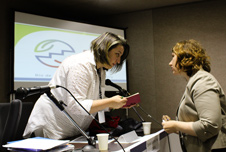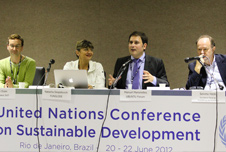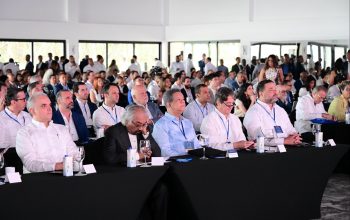news
GFDD-UBUNTU Side Event in Rio Urges Stakeholders to Make Eradication of Financial Speculation of Food and Related Commodities an International Priority
June 18, 2012Today, June 18, in Rio de Janiero, Brazil, Global Foundation for Democracy and Development (GFDD), along with partner institution UBUNTU – World Forum on Civil Society Networks, advocated that urgent actions be taken by the global community to curb speculation of food and related commodity markets, in order to reach internationally agreed upon benchmarks, including the Millennium Development Goals, and more specifically Goal 1, the eradication of extreme poverty and hunger.
Discussions took place during the side event “Food, sustainability and global democracy: challenges and perspectives,” coordinated by both institutions during the framework of the Sustainable Development Dialogues leading up to the United Nations Conference on Sustainable Development (Rio +20).
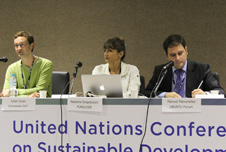
Presentations were delivered by Natasha Despotovic, Executive Director of Global Foundation for Democracy and Development (GFDD), Daniela Sanches Fonzi, Conselho Nacional de Seguranca Alimentar e Nutricional (CONSEA), and Julian Oram, Greenpeace International. Dialogue was moderated by Manuel Manonelles, Director of the UBUNTU Forum.
Central topics featured included the right to food; food sovereignty; lack of coherence in global governance; the establishment of
mechanisms to reduce price volatility and financial speculation of commodities; the commodification of nature; the role of instrumental intergovernmental organizations such as FAO, IFAD and WFP; and the functions of the Committee on World Food Security.
Ms. Despotovic presented the innovative perspectives of Global Foundation for Democracy and Development on the impacts of financial speculation on food security and global democracy, and promoted the decisive efforts taken
by Dr. Leonel Fernández, President of the Dominican Republic and Honorary President of GFDD, to make financial speculation of basic commodities within futures markets a priority item on the United Nations agenda of work.
Ms. Despotovic cautioned that failure to address this practice, which is now a predominant function of international market economy, is inherently dangerous, provoking and exacerbating rates of hunger, malnutrition and poverty, affecting the well-being,
health and livelihoods of millions of people worldwide.
While analysts have identified numerous issues that have contributed to the sharp increase in food commodity prices, few have identified the role of speculation in futures markets as a cause for concern.
The Executive Director of the US-based think tank underscored the fundamental changes that have come to define market economics over the last decade alone. Ten years ago, 70 percent of commodity
futures markets were comprised of physical hedgers and 30 percent were comprised of institutional investors. These percentages have since been reversed. Today, speculative activity governs 80 percent of the market, while commercial activity dictates a mere 20 percent.
“Official Development Assistance, Foreign Direct Assistance, resource revenue and investment from trade,” posited Despotovic, “collectively, cannot compete with the amount of
resources being injected into over-the-counter derivatives markets.”
“During the time of the Global Economic and Financial Crisis,” she asserted, “the notional value of the unregulated over-the-counter derivatives market was estimated to be US $596 trillion dollars.”
Ms. Despotovic put forth four recommendations aimed at eradicating excessive speculation: limits on the transactions of investors; margins
higher than the premiums required for underwriting commodity futures contracts; limits on the volume of transactions of institutional investors; and banning financial speculation of food in futures markets.
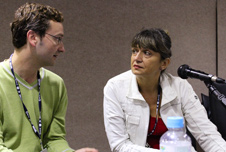
She also described the groundbreaking work spearheaded by President Leonel Fernández, which resulted in the proposal of the resolution
“Addressing Excessive Price Volatility in Food and Related Financial and Commodity Markets” (A/RES/66/188). The resolution, which called for the United Nations General Assembly to convene a High Level Thematic Debate on the effects of excessive speculative activity on food and related commodity markets, was adopted by consensus by the United Nations General Assembly on December 22, 2011. The first-ever High Level Thematic Debate “Addressing Excessive Price
Volatility in Food and Related Financial and Commodity Markets,” took place on April 11, 2012 at United Nations Headquarters in New York.
About High-Level Thematic Debate “Addressing Excessive Price Volatility in Food and Related Financial and Commodity Markets”
The objectives of the debate were four-fold: 1) contribute towards developing a global consensus on the impacts of excessive speculative
activity on commodity futures markets; 2) promote robust dialogue on how to best address excessive speculation in food and related commodity markets; 3) begin a process in which Member States assess and monitor the effects of excessive speculative activity; 4) advance global governance and the achievement of the Millennium Development Goals (MDGs).
The event featured a keynote address by President Fernández and presentations by finance specialists: Michael Greenberger
(Professor, University of Maryland School of Law), David Hallam (Director, Trade and Markets Division, FAO), Jeffery Sachs (Director, The Earth Institute, Professor Sustainable Development and Health Policy Management, Columbia University), Heiner Flassbeck (Director, Global Development Strategies, UNCTAD); Wei Xiong (Professor of Economics, Princeton University); Daniel Titelman (Chief, Financial Development Division, ECLAC); Keiichi Miyata (Director and Head, Financial Infrastructure
Studies Division, IMF); Frederick Kaufman (Professor of Journalism, CUNY); José Antonio Ocampo (Professor of Professional Practice in International and Public Affairs at Columbia University); Peter Kerstens (Counsellor, Economic and Financial Affairs Section, European Commission); and Bruce Tozer (independent expert and commodities trader).
Stakeholders called for the creation of a permanent multidisciplinary working group to continue the tasks proposed during the April
11th meeting, to complement the ongoing work of the Secretary General’s High Level Task Force on the Global Food Security Crisis and the Committee (2008) on World Food Security (2009).
Related links:
http://www.uncsd2012.org/rio20/about.html
http://www.un.org/ga/search/view_doc.asp?symbol=A/res/66/188&Lang=E
www.ubuntu.com
